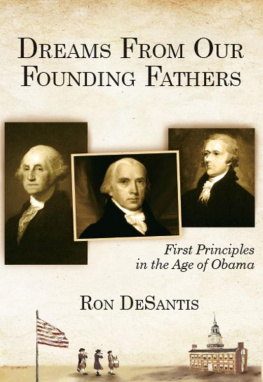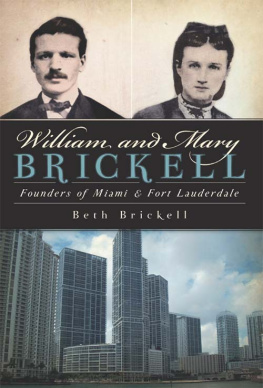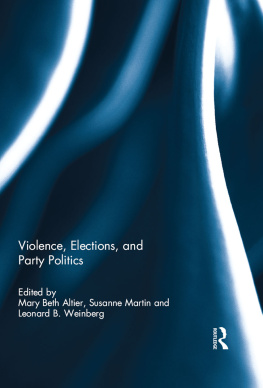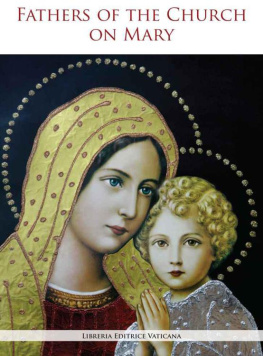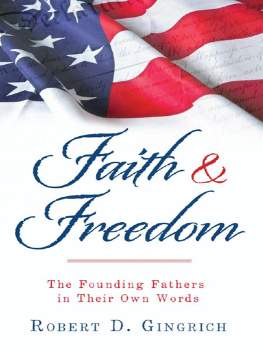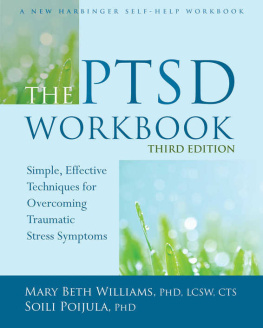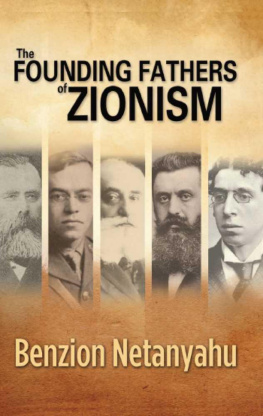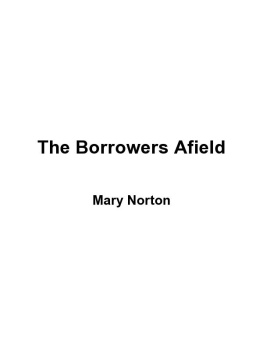Mary Beth Norton - Founding Mothers & Fathers
Here you can read online Mary Beth Norton - Founding Mothers & Fathers full text of the book (entire story) in english for free. Download pdf and epub, get meaning, cover and reviews about this ebook. year: 1996, publisher: Knopf Doubleday Publishing Group, genre: Politics. Description of the work, (preface) as well as reviews are available. Best literature library LitArk.com created for fans of good reading and offers a wide selection of genres:
Romance novel
Science fiction
Adventure
Detective
Science
History
Home and family
Prose
Art
Politics
Computer
Non-fiction
Religion
Business
Children
Humor
Choose a favorite category and find really read worthwhile books. Enjoy immersion in the world of imagination, feel the emotions of the characters or learn something new for yourself, make an fascinating discovery.

- Book:Founding Mothers & Fathers
- Author:
- Publisher:Knopf Doubleday Publishing Group
- Genre:
- Year:1996
- Rating:3 / 5
- Favourites:Add to favourites
- Your mark:
- 60
- 1
- 2
- 3
- 4
- 5
Founding Mothers & Fathers: summary, description and annotation
We offer to read an annotation, description, summary or preface (depends on what the author of the book "Founding Mothers & Fathers" wrote himself). If you haven't found the necessary information about the book — write in the comments, we will try to find it.
Founding Mothers & Fathers — read online for free the complete book (whole text) full work
Below is the text of the book, divided by pages. System saving the place of the last page read, allows you to conveniently read the book "Founding Mothers & Fathers" online for free, without having to search again every time where you left off. Put a bookmark, and you can go to the page where you finished reading at any time.
Font size:
Interval:
Bookmark:
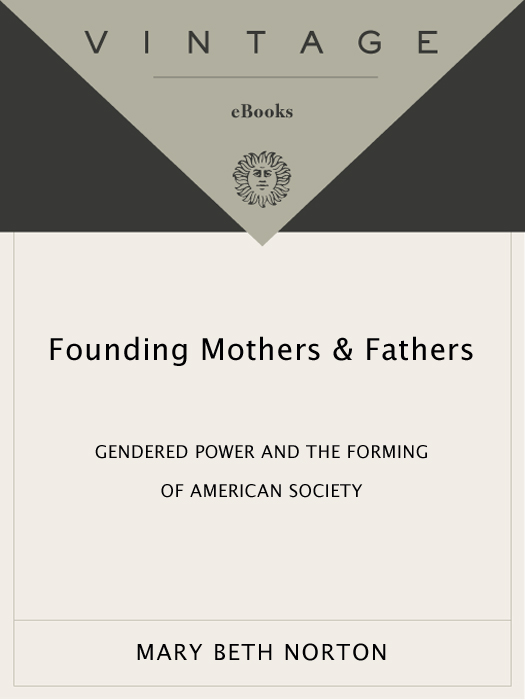
FOUNDING
MOTHERS & FATHERS
Mary Beth Norton received her B.A. from the University of Michigan in 1964, her M.A. from Harvard University in 1965, and her Ph.D. from Harvard in 1969. She taught at the University of Connecticut from 1969 to 1971, and since then has taught at Cornell University, where she has been Mary Donlon Alger Professor of American History since 1987. She is the author and co-editor of several books, including In the Devils Snare: The Salem Witchcraft Crisis of 1692, and served as the general editor of The AHA Guide to Historical Literature (3d ed., 1995).
In the Devils Snare: The Salem Witchcraft Crisis of 1692
Major Problems in American Womens History (editor with Ruth Alexander)
To Toil the Livelong Day: Americas Women at Work, 17901980 (editor with Carol Groneman)
A People and a Nation (with five co-authors)
Libertys Daughters: The Revolutionary Experience of American Women, 17501800
Women of America: A History (editor with Carol Berkin) The British-Americans: The Loyalist Exiles in England, 17741789
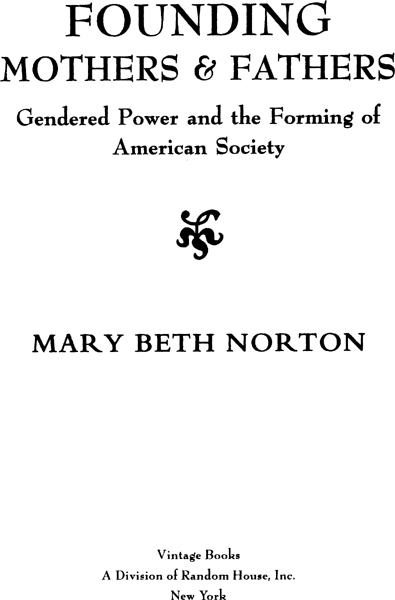
for
Bernard Bailyn
SECTION I:
PROLOGUE:
CHAPTER 1:
CHAPTER 2:
CHAPTER 3:
SECTION II:
PROLOGUE:
CHAPTER 4:
CHAPTER 5:
SECTION III:
PROLOGUE:
CHAPTER 6:
CHAPTER 7:
CHAPTER 8:
APPENDIX:
As an undergraduate at the University of Michigan, I studied political theory and intellectual history, and I enrolled in graduate school at Harvard University intending to become an intellectual historian. While at Harvard, though, like many other scholars of my generation, I became enthralled by social history andin particularthe excitement of studying the lives of ordinary Americans in the colonial period. Subsequently, I was drawn to the newer field of womens history and even more recently to its broader incarnation, the study of gender in its many and varied manifestations. Thus the research reported in this book, which has occupied me for more than a decade, combines an earlier interest in political theory and intellectual history with my more recent fascination with social history and especially women and gender.
The first stages of the intellectual odyssey just described owe much to the influence of three men: Frank Grace, who taught me political theory at the University of Michigan; John Higham, who introduced me to intellectual history and directed my undergraduate honors thesis; and Bernard Bailyn, who became my graduate mentor. That I have chosen to dedicate this book solely to the last is not to slight the influence of the other two but rather to highlight the great debt I owe to Bud Bailyn, who over the years has become friend as well as teacher. I only wish that Frank Grace were still alive to see that I have not forgotten those intriguing gentlemen to whom he first systematically introduced meSir Robert Filmer, Thomas Hobbes, and John Locke.
This book could never have been written without the assistance of many former Cornell graduate and undergraduate students, who spent innumerable hours immersed in the court records of seventeenth-century America, translating the details of civil and criminal cases into numerical values that could be analyzed by computer. My thanks go to Ruth M. Alexander, Daniel Alonso, Gavin Campbell, Yong Chen, Julia Chu, Joanne Gernstein, Alan Ginet, Eric Mitnick, Celia Naylor, Susan Steigerwald, and especially to Vivian Bruce Conger and Julie Curry, the two who devoted more years to this project than they probably care to recall. As I was in the final stages of preparing the book manuscript, A. Paige Shipman served as my general aide and research assistant, cheerfully tackling every assignment I gave her with good humor and assiduity.
Although this book has taken considerably longer to research and write than I anticipated when I began to work on it in 1982, it would have taken far longer had it not been for the generosity of several funding agencies. I gratefully acknowledge the financial assistance of the American Antiquarian Societys Peterson Fellowship, which supported a month of research in the societys collections in 1984; the Rockefeller Foundation, which awarded me a Gender Roles Fellowship in 198687 and served as my host for a productive month at the Villa Serbelloni International Center for Scholars in April 1992; the Society for the Humanities at Cornell University, which designated me a resident fellow in 198889; and the John Simon Guggenheim Memorial Foundation, for a fellowship that supported the writing of this books first draft during the 199394 academic year. In addition, I received ongoing assistance from the Humanities Research Fund, the Return Jonathan Meigs III Fund, and the Mary Donlon Alger endowment at Cornell University.
Although much of this work is based on published materials, archivists at the American Antiquarian Society, the Connecticut State Library, the Massachusetts State Archives, the Phillips Library of the Peabody Essex Museum, the Massachusetts Historical Society, and the Maryland Hall of Records helped in essential ways. I am grateful to them all, and to the county clerk of Dukes County, Massachusetts, for dealing with a variety of inquiries.
I have learned much from the comments offered by many audiences and individual historians who have listened to or read pieces of this project over the years. In particular, I express my thanks for useful and often spirited criticisms to those who attended my Commonwealth Fund lecture at University College London in February 1987 (especially the commentators, Roger Thompson and Gwenda Morgan); to the other participants in the Harvard conference in honor of Bernard Bailyn in October 1987, especially the ever-generous Lois Green Carr; to Laurel Thatcher Ulrich and John M. Murrin, the commentators on my paper at the 1990 Berkshire Conference on Womens History; to Cynthia Herrup, who read some early article-length drafts; and to my colleagues in the Cornell Womens Studies program, who have discussed several parts of this project at different times. Drafts of the book manuscript have been read and commented upon by my graduate students Jackie Hatton and Leslie Horowitz, my former colleague Clive Holmes, and my current colleagues I. V. Hull and Rachel Weil. My editor, Jane N. Garrett, has offered sage advice. The book is definitely the better for all their contributions. Any errors of judgment that remain are mine alone.
Finally, I thank my friends on Marthas Vineyard and in Ithaca (especially the other members of the SPCC) for many years of listening to me recount at too-great length the latest seventeenth-century scandal. They have put up with my eccentric obsession with a world three centuries gone for far too long. I appreciate their forbearance and their support.
T HE SIGNING of the Mayflower Compact in November 1620, on shipboard off Cape Cod, provides one of the most enduring images of early American history. It was thought good there should be an association and agreement, recalled one participant, that we should combine together in one body, and to submit to such government and governours, as we should by common consent agree to make and choose. Therefore, the male passengers on the Mayflower
Font size:
Interval:
Bookmark:
Similar books «Founding Mothers & Fathers»
Look at similar books to Founding Mothers & Fathers. We have selected literature similar in name and meaning in the hope of providing readers with more options to find new, interesting, not yet read works.
Discussion, reviews of the book Founding Mothers & Fathers and just readers' own opinions. Leave your comments, write what you think about the work, its meaning or the main characters. Specify what exactly you liked and what you didn't like, and why you think so.


